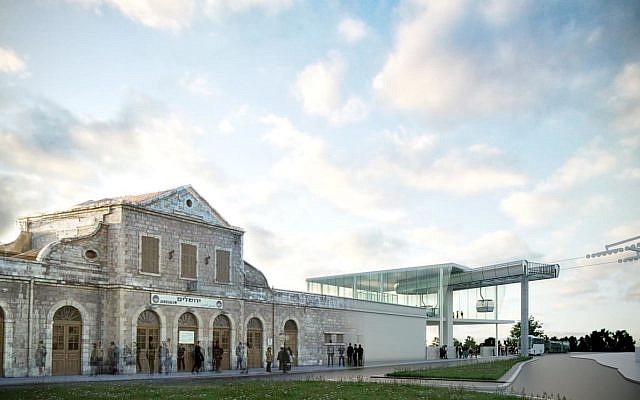The Supreme Court on Sunday rejected four appeals against the controversial plan to build a cable car to the Old City of Jerusalem, depriving its opponents of any legal recourse.
Speaking on behalf of a three-judge panel, Judge Yosef Elron said the Court’s role was to intervene in fraudulent planning decisions or when developers made decisions based on irrelevant considerations or beyond the bounds of the original project.
This is not the case with the cable car project, established Elron.
Receive our free daily edition by email so you don’t miss any of the best news Free registration!
Accusing the court of having taken a political decision, the non-profit organization “Emek Shaveh”, which fights against the installation of a cable car line in the capital, indicated that the public campaign was “just beginning”. “.
The left-wing organization, which specializes in protecting the public character of antiquities and which fights the instrumentalization of archeology for political ends, has long clashed with the powerful, private, right-wing City of David Foundation ( known as Elad in Hebrew).
Elad is dedicated to maintaining a Jewish presence in the Old City basin, and one of its biggest projects is the construction of a visitor center outside the walls of the Old City, which will include the cable car station at the Porte des Maghrébins.
Architect’s view of the cable car station next to the First Station cultural complex, Jerusalem. (Credit: Courtesy of Jerusalem Development Authority)
Eli Ben Ari, legal adviser to Adam Teva V’Din, another opponent of the project, said the decision to build a cable car should not have been taken without a thorough study of other ancient cities. Such a survey would have shown that no other city would have dared to build a cable car so close to the ancient city walls, he said.
Ben Ari added that better, simpler and cheaper options for easing traffic jams around the walls of the Old City – the cable car’s stated purpose – had been too quickly dismissed.
Opponents of the project also include shop owners in the Old City as well as residents of the Palestinian neighborhood of Silwan, over which the cable car will pass, and the Karaite community at large.
The latter claims that to pass a cable car over her cemetery, located on the southern slopes of the Valley of Hinnom, would amount to covering it and making it inaccessible to members of the community, according to Karaite religious law.
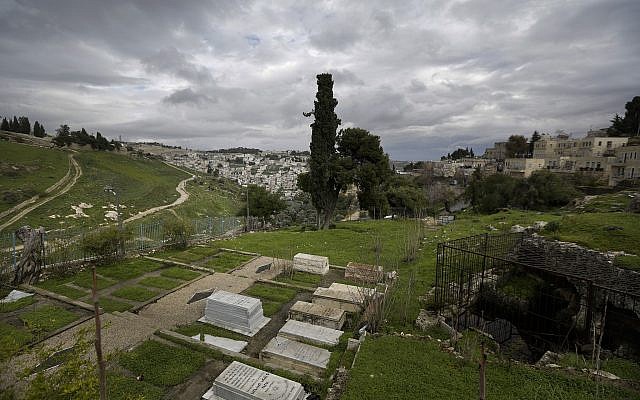
The Karaite cemetery in Jerusalem pictured on March 2, 2019. (AP Photo/Dusan Vranic)
The NIS 200 million project, authorized by the government in November 2019, draws a 1.4 kilometer corridor from the Old Railway Station shopping and entertainment area in West Jerusalem, flying over a valley mainly populated by East Jerusalem Palestinians to arrive at the Old City’s Garbage Gate, near the Western Wall and the City of David archaeological site.
The cable car will rest on fifteen pylons, from nine to 26 meters high, visible from key points overlooking the Valley of Hinnom.
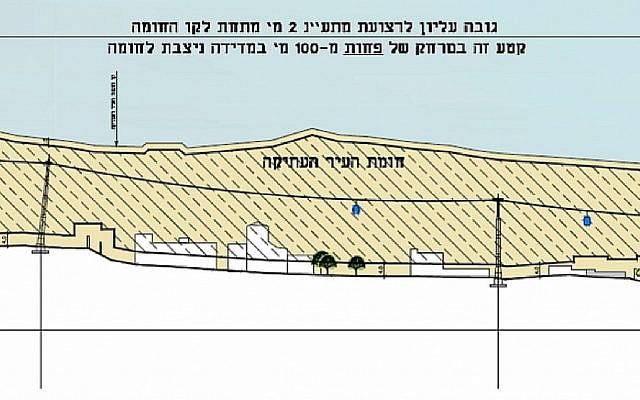
Architect’s plans for a cable car in Jerusalem showing pylons parallel to the Old Wall. (Credit: Part of the plans submitted to the National Planning Committee).
An intermediate station will be located at Mount Zion and a storage depot for the cabins will be set up in the Abu Tor district.
Project advocates at the Tourism Ministry and the Jerusalem Municipality argue that the cable car will attract tourists and help decongest the area surrounding the Old City walls in the greenest, least disruptive and most financially sustainable way. . It will also drive up to 3,000 visitors per hour from West Jerusalem to the Western Wall, the most revered site where Jews can pray.
The many opponents of the project maintain that it is very intrusive, in addition to being culturally and politically irresponsible, and that it will only move the traffic problem to the Old Station.
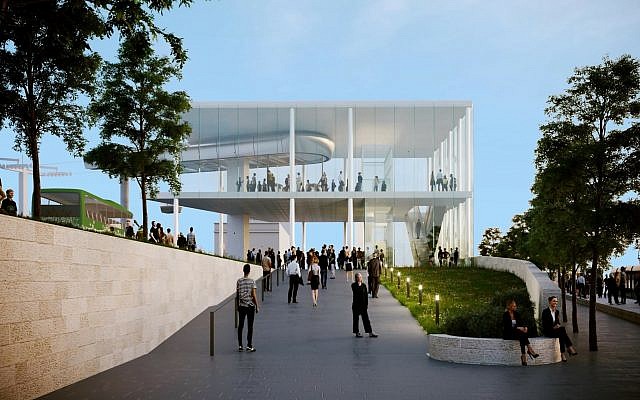
Artist’s impression of a station on the route of the future cable car that will stretch from Jerusalem’s First Station to the Western Wall in the Old City. (Credit: Courtesy of Jerusalem Development Authority)
Pulling the rug out from under opponents, Elron assured that there were no flaws or flaws in the Tourism Ministry’s decision to refer the project to the National Infrastructure Commission, and that the latter had received enough elements, that the project met the definition of a tourism and transport project, and that the Ministry of Transport had been sufficiently involved in the decisions.
The Department of Tourism’s view that it was a genuine tourist attraction was sufficient, Elron said, adding: “It should be borne in mind that the Supreme Court does not substitute its discretion for that of the minister, but [demande seulement] if the discretion departs from the bounds of reasonableness. »
Elron and the two other judges, Alex Stein and Anat Baron, also concluded, contrary to the assertions of the opponents, that an adequate analysis of the alternative solutions had been carried out.
In his decision, Elron did not question a much criticized traffic plan whose conclusions favor the cable car as a preferable – faster and simpler – alternative to the tram. He did not compile a detailed report on the objections of Silwan residents and Old City shop owners.
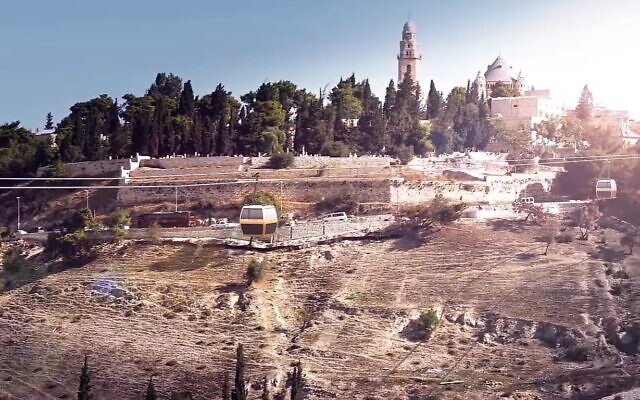
Screen capture from a promotional video for the Jerusalem Old City cable car project showing an artist’s impression of cabins passing over the Valley of Hinnom. (Credit: YouTube)
Regarding the claims of the Karaite community, Elron found no justification for intervening, noting that talks between the community and the Jerusalem Development Corporation had failed. He called for their recovery.
The Jerusalem Development Corporation had offered to move the cable car lines away from the open part of the cemetery and relocate the affected graves at its expense, Elron said.
It is important to balance protecting the integrity of the dead against the public interest inherent in carrying out the project, Elron wrote, concluding that in the absence of a “practical possibility” of moving the line further than the initial proposal, and without damage to the graves, the compromise reached by the government and the National Infrastructure Committee was “appropriate and proportionate”.
Elron said the opponents’ main contention that the cable car was unsuitable for the landscape and surroundings of the Old City was understandable.
“This is a complex issue,” he wrote, “requiring a delicate balance between a wide range of considerations. »
But it’s clear that any solution – from adding more buses to doing nothing – will come at a price. There is “no perfect solution” and the planning authorities, aware of the difficulties, decided to authorize the cable car anyway, he concluded.
We would like to thank the author of this short article for this remarkable web content
Rejection of appeals against the construction of the cable car in Jerusalem
Explore our social media accounts along with other related pageshttps://nimblespirit.com/related-pages/

